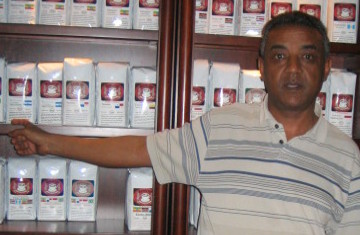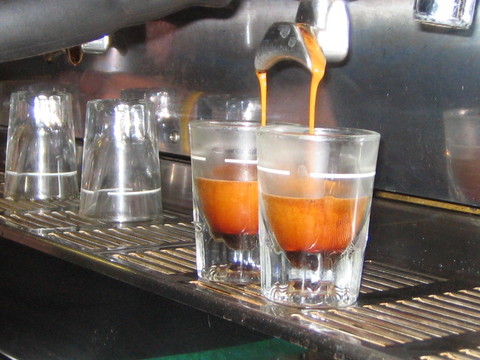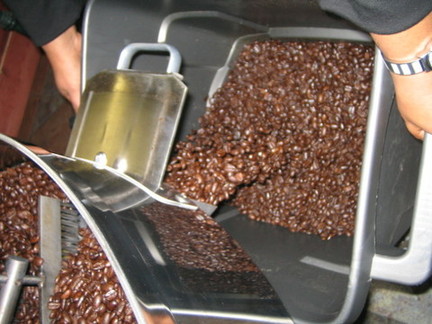Above: Zelalem Yilma, right, pours coffee during Sunday’s
Ethiopian coffee ceremony at The Burke Museum. Yilma and
others hosting the event described the Ethiopian coffee ritual
as a way for their people to socialize, gossip, discuss news
and politics and share culture. Erika Schultz / Seattle Times
Source: Seattle Times
By Melissa Allison
The opposite of instant coffee is not a nice, slow French press. It is a centuries-old coffee ritual from Ethiopia, the birthplace of coffee. Stepping inside on Seattle’s most gorgeous day so far this year, a few dozen visitors to the Burke Museum participated in the ceremony Sunday. They chatted and sipped Ethiopian coffee roasted before their eyes by three native Ethiopians who enjoy sharing the ritual with fellow Seattleites. Read More.
Related from Tadias – Ethiopian Coffee via Kansas (Interview)

Tadias Magazine
By Tadias Staff
Published: Saturday, March 21, 2009
New York (Tadias) – While Starbucks lags behind on their promise to open a support center for its coffee farmers in Ethiopia, Kansas-based Revocup Coffee Roasters is giving back 10 cents for every cup of coffee and 1 dollar for every pound of coffee sold. After revisiting their birth place, the founders of Revocup wanted to change what they saw as the “deteriorating life” of Ethiopian coffee farmers (well-described in the documentary Black Gold). Ethiopia is known as the birthplace of coffee, and the coffee ceremony is an integral part of the nation’s heritage, which is yet another reason Revocup is keen on promoting fair trade for Ethiopian coffee.
Tadias recently interviewed Habte Mesfin about Revocup:
Tadias: Please tell us about Revocup?
Habte Mesfin: Revocup is a coffee roasting company and a coffee shop based in Overland Park, Kansas. Revocup Coffee Corp. was established to offer consumers a wide range authentic single origin coffee from Ethiopia in the freshest form possible.
Tadias: What inspired you to get into the coffee business?
HM: Coffee cafes are a familiar feature of American life. Every day millions of Americans stop at cafes for an espresso-based drink. People who would not have dreamed of spending more than 50 cents for cup of coffee a few years ago now gladly pay $3 to $5 for their cappuccino, mocha, or vanilla ice-blended drink. The public shows tremendous interest embracing and adopting the new coffee culture. However the quality of coffee offered in the shops has deteriorated. As an Ethiopian who grew up with a superior coffee culture and tradition we felt that it’s time to get into the business as well as share our heritage.
Tadias: Revocup brand is based on promoting freshly roasted coffee beans, similar to how we consume coffee in Ethiopia. Who is your target market in the U.S.?
HM: Our target market is not directed to a certain group or population. We are offering our product for people who seeks quality coffee. Revocup coffee strongly believes that freshness is very important, there is no short cut or substitute. Coffee should not be an industrial product. It is a farm product, which does not have a long shelf life. Coffee needs to be consumed while it is fresh. Based on this principle we are roasting our coffee per order and according to the amount of coffee that we sell in our store.
Tadias: On your website you mention that most professional
roasters in the industry agree that 95% of the coffee consumed in this
country is stale. Can you elaborate?
HM: This is very true. In order to give a good answer for this question we need to look into how the coffee supply chain works. Large coffee companies roast thousands of pounds of coffee at a time at remote locations and then send that coffee to be bagged to anther part of the country. Then it will go to a distribution center. From there it make its way to grocery stores. Once it makes it to the shelf you do not know how long it is going to sit on the shelf. By the time it gets into your hands as a consumer the coffee is old and stale. You don’t know when this coffee was harvested or roasted when you pay to buy it. The coffee that you take home has essentially lost its character, wonderful aroma and unique natural flavor. That is why almost all craft roasters agree on the above mentioned fact. The sad part is that there is no rule or regulations to enforce coffee companies to put a roast date on their coffee labels. Amazingly, they get away with selling stale products. We ensure the authenticity of our coffee at Revocup by disclosing the origin of coffee, and mentioning the country of origin and farm name. We also post the country’s flag as an identification mark on our label. In order to guarantee freshness we also include the roast date on each bag of coffee sold.
Tadias: Isn’t the coffee preparation from “crop to cup” time consuming for the fast-paced lifestyle in America?
HM: In order to enjoy a great cup of coffee it requires meticulous preparation from the farm all the way to your cup. Along the way so many things can go wrong to affect the bean quality. What we are doing is preventing potential causes of negative impact. The very first thing you do even if it is expensive, is to purchase authentic high quality single origin coffee and make yourself familiar with the beans, and develop a roast profile that can show the coffee character. Then roast the coffee per order prior to shipping and bag the coffee into a one-way degassing valve bag to prevent air intrusion. Finally, disclose to consumers when the coffee was roasted and advise them on appropriate ways of coffee brewing that enhances taste and flavor. I can understand that people may not have the time to roast coffee every morning like we do traditionally in Ethiopia. However, they can selectively purchase freshly roasted coffee from a local roaster such as Revocup and enjoy their cup of coffee while the full flavor is intact. I do not see a reason why people pay for dark roasted (burnt) pre-ground coffee that tastes like charcoal. In my opinion it is a great injustice to the farmers and the people who work hard to produce the coffee.
Tadias: Are all your coffee beans are from Ethiopia?
HM: We purchase coffee from all coffee producing countries. That includes Brazil, Guatemala, Kenya, Costa Rica, El Salvador, Nicaragua, Panama, Colombia, Mexico, Indonesia Etc. But over 60% of our coffee comes from Ethiopia. We carry almost all Ethiopian coffees including Harrar, Sidamo, Yergacheffee, Limu, as well as special reserve micro lot selections like Beloy, Aricha, Aleta and Wondo.
Tadias: Do you have any less well known, unique brands at Revocup?
HM: We carry all sorts of coffee and each coffee has its own character and flavor profile. Our website, Revocup.com, lists over 42 different type of coffee. Consumers can also order our coffee online.
Tadias: Why Kansas?
HM: We initially moved to Kansas to get closer to family and relatives. Arriving here we realized that being located at the nation’s center was very convenient for transportation of our products.
Tadias: Thank you Habte, we’re glad to see an Ethiopian-owned company involved in fair trade coffee distribution and we commend your efforts!

